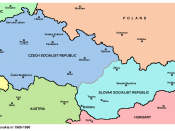Introduction
In 1989, after nearly 40 years of Soviet control, Czechoslovakia once again became an independent nation, the Czech and Slovak Federalist Republic. This transition from Soviet socialism to democracy culminated throughout Central and Eastern Europe with the literal collapse of the Berlin Wall in East Germany, the heroic Gdansk Shipyard Strikes in Poland. The student and worker protests in Prague and Budapest were no less important.
The Czechoslovakian revolution took place peacefully and over a much longer period of time than events in other former Soviet Union or Warsaw Pact nations. Hints of major reform in Czechoslovakia began as early as 1968. Czechoslovakian officials, under Soviet power, moved incrementally to begin the long road towards decentralization and independent Czechoslovakian rule. Their increasingly effective efforts became known as the Prague Spring, a time of growth, change and development.
Success was, of course, neither immediate nor easy to achieve. The Cold War reached a pinnacle in the Eighties and the winds of change began to blow in Central and Eastern Europe.
The CEE nations endured many hardships. Soviet oppression, though waning by this time, became largely unbearable. Change in Czechoslovakia came from the ground up; dissidents quietly began to return to popular power. The revolution gained momentum by 1989. 'Revolutionists' began to demand sweeping economic and political reform. They were backed by well organized and very timely strikes and protests. After a two hour general strike on November 27, 1989, proving the immediate and widespread power and cohesion of the revolution, the Soviet controlled authorities finally agreed to negotiate.
Through the negotiation process and threat of further massive general strikes, former dissidents assumed officially sanctioned 'concessional' positions. Within months, they gained near complete (and very real) control of the Federal Assembly. On December 29, 1989, Mr. Havel, a very famous and...


